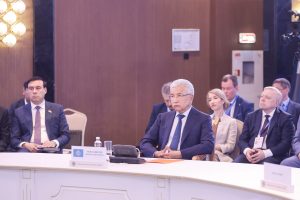On March 30, a video was uploaded to the unofficial Instagram account of Imangali Tasmagambetov, a Kazakh national who is the head of the Collective Security Treaty Organization (CSTO). In the video, Tasmagambetov, speaking in Kazakh, quoted multiple Kazakh writers and spoke about his upbringing in western Kazakhstan, all with one clear goal: to distance himself from allegations of being pro-Russian.
The allegations against the CSTO general secretary began circulating after a March interview he gave to the Russian newspaper Izvestia. In the interview, Tasmagambetov stated that the organization would be ready to respond if European states decided to send peacekeeping forces to Ukraine: “If such risks arise, the CSTO will be ready to offer various options for assistance within the framework provided for in the organization’s statutory documents and, of course, approved by all member states.”
Similar to NATO, the goal of the CSTO is collective security, albeit on a much smaller scale. its member states include Armenia, Belarus, Kazakhstan, Kyrgyzstan, Russia, and Tajikistan.. The statement by Tasmagambetov sparked online backlash in Kazakhstan and generated fears that the country might have to send troops to Ukraine in the near future.
Since the start of the war, Kazakhstan’s official stance on Ukraine has been neither pro-Russian nor pro-Ukrainian. Instead, it has been “pro-Kazakh,” as Deputy Foreign Minister Roman Vassilenko said in 2023. This is also the position that President Kassym-Jomart Tokayev has stated multiple times, including again in February of this year. To this day, the neutral stance remains prevalent in Kazakhstan, with many people supporting the government’s position.
A recent survey from the Kazakh polling company Demoscope showed that 61 percent of people living in Kazakhstan are still neutral or find it difficult to gauge who to support in the war. In the same survey, Demoscope also found that 25 percent of respondents viewed a Russian attack on Kazakhstan as possible. However, fearing a Russian attack is not new. A similar survey from 2023 found that 15 percent of Kazakhs feared an attack on the country.
Despite this prevalent fear in parts of society, Kazakhstan is unlikely to make a sudden break from Russia or the CSTO. Along with Tasmagambetov serving as the general secretary of the organization, the Kazakh state maintains a strong connection to the CSTO as a founding member. At a meeting just last year, which concluded Kazakhstan’s chairmanship of the organization, Tokayev praised the CSTO “as a guarantor of security for all participating countries.” This came in addition to Kazakhstan pledging to continue buying Russian military equipment at the same meeting.
Despite generally being vocal about the CSTO, Tokayev has been completely silent regarding the recent comments from Tasmagambetov. According to one expert, a reason for this could be the CSTO’s presence during the violent quelling of protests in Kazakhstan during what is referred to as Bloody January in 2022. As a result, many Kazakhs now see the organization in a negative light.
The January 2022 unrest led to the first large-scale operation for the CSTO, when Armenian, Belarusian, Kyrgyz, Russian, and Tajik soldiers were sent to Kazakhstan. But while this specific operation was deemed a success by some, the organization has faced significant problems both before and after.
Initially growing from its six founding member states in 1992 to nine states in 1994, the organization’s strength has since deteriorated, now falling back to six members. For a short while in 2023, it even seemed the CSTO would be left with only four members after rumors circulated that Kazakhstan and Armenia would withdraw. While Armenia decided to freeze its membership last year over disputes with the CSTO regarding protection of the Nagorno-Karabakh region, the Foreign Ministry of Kazakhstan quickly denied any such intention.
Despite staying in the CSTO, Kazakhstan has in recent years been hesitant to fall in line with the organization’s largest member, Russia. For example, Kazakhstan has stated that it will not recognize the separatist republics of Luhansk or Donetsk. Even before the full-scale war, Kazakhstan refused to send CSTO peacekeeping forces to these areas.
While officially representing the CSTO, Tasmagambetov has had to navigate his home country’s multipolar relationship with Russia. Walking this fine line is important for the future career of Tasmagambetov, who, according to some, could be a viable candidate for president in Kazakhstan. Whether that is actually his plan, only time will tell. For now, we can only say that his efforts to avoid being perceived as pro-Russian have had mixed results, with some calling him a hero, and others saying he is in Russia’s pocket.

































